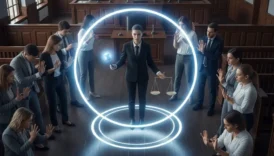What Is a Legal Motion?

In court proceedings, parties often need to ask the judge for specific decisions before or during a trial. The tool they use for this is a legal motion. Motions are essential in shaping how cases move forward, influencing everything from evidence to trial procedures.
Simple Definition
A legal motion is a formal request made to a court by a party in a case, asking the judge to issue a ruling or order on a specific matter.
Real-Life Examples
- Motion to dismiss: A defendant asks the court to throw out the case because of insufficient legal grounds.
- Motion for summary judgment: A party requests a ruling without a full trial, claiming facts are undisputed.
- Motion to suppress evidence: A defendant seeks to exclude illegally obtained evidence.
- Motion for continuance: A party asks to delay the trial or hearing.
Importance of the Term
- Shapes case strategy: Determines what evidence or arguments are allowed.
- Saves time and cost: Can resolve issues before trial, avoiding unnecessary litigation.
- Ensures fairness: Protects parties’ rights by addressing disputes during proceedings.
- Promotes efficiency: Helps courts manage cases more effectively.
Types of Legal Motions
| Type | Purpose |
|---|---|
| Pre-trial motions | Requests made before trial (e.g., dismissals, evidence issues). |
| Trial motions | Requests made during trial (e.g., directed verdicts). |
| Post-trial motions | Requests after trial (e.g., motions for a new trial, appeal relief). |
| Procedural motions | Requests dealing with scheduling, deadlines, or discovery. |
FAQ
1) Who can file a legal motion?
Either party in a case—plaintiffs, defendants, or their attorneys—can file motions.
2) How does a judge decide on a motion?
Judges review legal arguments, evidence, and sometimes hold hearings before ruling.
3) Do motions always require hearings?
Not always. Some are decided based on written arguments alone.
4) Can motions end a case early?
Yes. For example, a motion to dismiss or a summary judgment motion can resolve a case without trial.
5) Are motions used in both civil and criminal cases?
Yes. They are a common feature of all types of legal proceedings.
Closing
A legal motion is a fundamental procedural tool in court cases. By allowing parties to request rulings on specific issues, motions help ensure fairness, efficiency, and proper application of the law throughout the judicial process.






